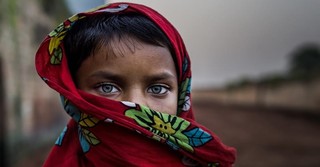Powerful Verses That Prove God Cares About Racial Reconciliation
Share

God has a picture of reconciliation that can help us break down the walls we’ve built up between each other. It’s time the church starts paying attention, because the message is loud, clear, and irrefutable.
If we are to the be the hands and feet of Jesus, we are to live the love of Christ. And that starts with seeing “all nations” as the Lord sees them. But we cannot truly see until we understand God's heart.
Here are 10 verses the church needs to hold on to right now, more than ever. Are you bold enough to read them?

1. God sees past our race, gender, and divisions.
“There is neither Jew nor Greek, slave nor free, male nor female, for you are all one in Christ Jesus." Galatians 3:28
Not only that, but the Bible says we were all made in “God’s image”. All of humanity sprung from Adam and Eve, and God planned it that way. This means that literally “all people” are made in God’s image. That fact, in and of itself, should be powerful enough to stop us in our tracks.
Here's another foundational truth: when the Bible says that “God so loved the world”, we have to remember that “the world” means the world in its entirety. Those words aren’t pointed exclusively to God’s chosen people, or even at those God knew would choose to follow Him. It’s pointed at “all”: those of different nations, tribes and tongues…those who follow him and those who don’t…those who love others and those who persecute them…those who are like us and those who are different. All.
But here's what else is striking about God's plan:
Photo Credit:©Thinkstock

2. God’s good plan is to bring together all nations.
Daniel 7:14: “He was given authority, glory and sovereign power; all peoples, nations and men of every language worshipped him. His dominion is an everlasting dominion that will not pass away, and his kingdom is one that will never be destroyed.”
Zephaniah 3:9: “Then will I purify the lips of the peoples, that all of them may call on the name of the LORD and serve him shoulder to shoulder.”
Photo Credit:©Unsplash

3. His good plan is also to BLESS all nations.
Not only does the Lord want to bring all people together, His desire (and plan!) is to bless them—all of them.
Psalm 72:17: “May his name endure forever; may it continue as long as the sun. All nations will be blessed through him, and they will call him blessed.”
Isaiah 2:2: “In the last days the mountain of the LORD’s temple will be established as chief among the mountains; it will be raised above the hills, and all nations will stream to it.”
Isaiah 25:6: “On this mountain the LORD Almighty will prepare a feast of rich food for all peoples, a banquet of aged wine – the best of meats and the finest of wines.”
Photo Credit:©Unsplash

4. People of “all nations, tribes and tongues” are described standing before God’s throne.
The book of Revelation describes John’s incredible vision:
“After this I looked, and there before me was a great multitude that no one could count, from every nation, tribe, people and language, standing before the throne and before the Lamb. They were wearing white robes and were holding palm branches in their hands.” Revelation 7:9
See also Revelation 21:24.
Photo Credit:©Unsplash

5. Christ's blood brings us together despite our differences.
All through the Bible, we see God’s heart of reconciliation. It manifests itself most powerfully through the big-picture narrative of Christ’s sacrifice, and the redeeming power of His love. But bringing the lens a little closer we can see that, through Christ, it was God’s design and dream to bring together two disparate people groups—Jew and Gentile—bringing both to Himself.
"For he himself is our peace, who has made the two groups one and has destroyed the barrier, the dividing wall of hostility, by setting aside in his flesh the law with its commands and regulations. His purpose was to create in himself one new humanity out of the two, thus making peace, and in one body to reconcile both of them to God through the cross, by which he put to death their hostility." Ephesians 2:14-16
Photo Credit:©Unsplash

6. God tells us to be different from the rest of the world and love with impartiality.
Because this is the way He first loved us, and it's different than what the world knows. In John (13:34) Jesus states, "a new commandment I give to you, that you love one another: just as I have loved you, you also are to love one another.
Ephesians 4:32: “Be kind and compassionate to one another, forgiving each other, just as in Christ God forgave you.”
Romans 6:13: “Present yourselves to God as being alive from the dead, and your members as instruments of righteousness to God.”
Photo Credit:©Unsplash
.800w.tn.jpg)
7. The Bible writes that God has actually given each of us "a ministry of reconciliation."
2 Corinthians 5:19: "All this is from God, who reconciled us to himself through Christ and gave us the ministry of reconciliation: that God was reconciling the world to himself in Christ, not counting people’s sins against them. And he has committed to us the message of reconciliation."
God wants to reconcile the world to Himself, and it’s a message that we’re responsible to spread. But we cannot spread the message of reconciliation to God if we are unreconciled with one another.
This message—and lifestyle—is one we’re going to be responsible for before God.
Photo Credit:©Unsplash

8. God says to "pay careful attention” so that we’re able to care for one another.
Acts 20:28: "Pay careful attention to yourselves and to all the flock, in which the Holy Spirit has made you overseers, to care for the church of God, which he obtained with his own blood."
If it took so much to reconcile humanity to himself, we must be reconciled to one another. When God calls us to “care for the church of God”, once again, we have to look back at God’s vision for the world and see that it includes all people. Those within our immediate communities—the people familiar to us—and those outside of them.
Photo Credit:©Thinkstock

9. We have to remember that God identifies with the marginalized.
It’s an unbelievable thing to think about: the God of the universe puts His own face on the marginalized and mistreated. He tells us that “whatever [we] do to the least of these”, we are actually doing to Him.
Another sobering truth to consider: the Bible says God will punish those who ignore this fact.
“The King will reply, ‘Truly I tell you, whatever you did for one of the least of these brothers and sisters of mine, you did for me.’ “Then he will say to those on his left, ‘Depart from me, you who are cursed, into the eternal fire prepared for the devil and his angels. For I was hungry and you gave me nothing to eat, I was thirsty and you gave me nothing to drink, I was a stranger and you did not invite me in, I needed clothes and you did not clothe me, I was sick and in prison and you did not look after me.’ “They also will answer, ‘Lord, when did we see you hungry or thirsty or a stranger or needing clothes or sick or in prison, and did not help you?’ He will reply, ‘Truly I tell you, whatever you did not do for one of the least of these, you did not do for me.’ Then they will go away to eternal punishment, but the righteous to eternal life.” Matthew 25:40-46
Brothers and sister, may we see others—and love others—with the heart of God.
Photo Credit:©Unsplash
See also: Charlottesville and the Christian Response: What Happens Now?
and How the Church Can Take Action Against Racism
Cristina Rutkowski is the editor of BibleStudyTools.com.